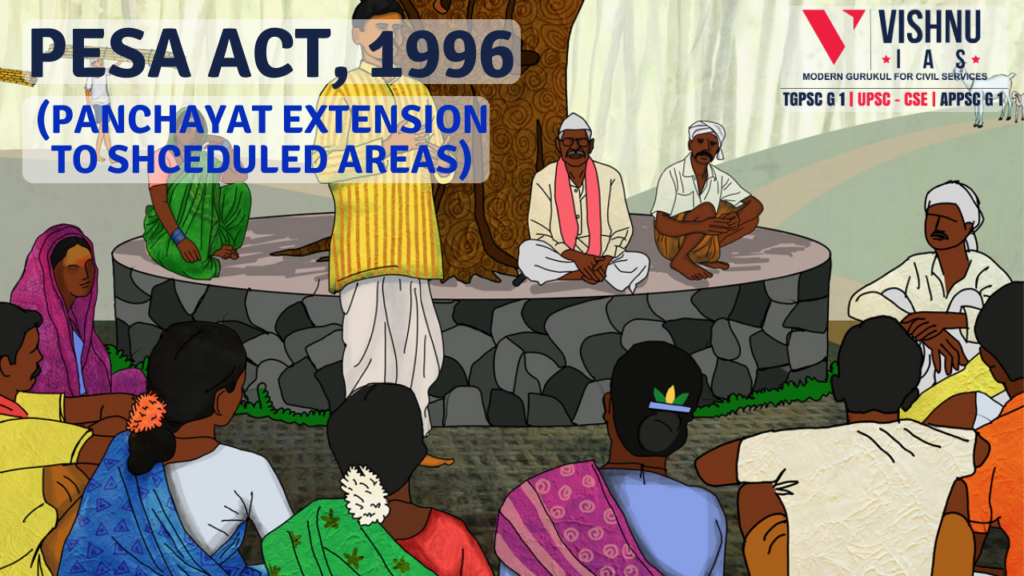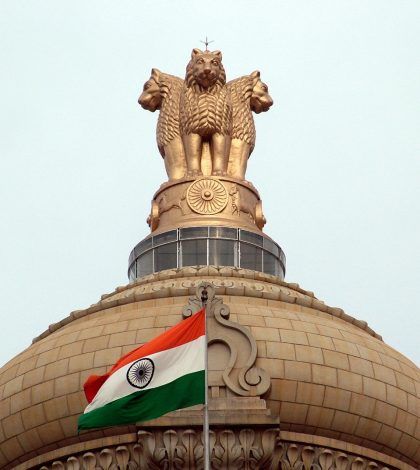PESA act, 1996
Approach
- Introduction: Write few points about the PESA Act
- Body: add How is PESA Act empowering local self-governance and impacting women’s political participation?
- Conclusion: add its present status
INTRODUCTION
The Provisions of the Panchayats (Extension to Scheduled Areas) Act, 1996 (PESA Act) is a significant piece of legislation aimed at empowering local self-governance in India’s scheduled tribal areas.
BODY
PESA ACT 1996
- Under this act part IX of the constitution [73rd CAA] will be applied to schedule V areas which enables the panchayats to function as institutions of self-government under PESA act the power provided to Gram Sabha are:-
- Power to prevent alienation of land in the scheduled areas and to take appropriate action.
- Gram sabha is empowered to release any unlawfully alienated land of a ST
- Gram sabha will have ownership over the minor forest produce
- Power to enforce prohibition or to regulate the sale and consumption
- of any intoxicant.
- Power to exercise control over money lenders
- Power to exercise control over Institutions and functionaries in all the socialsectors [ primary health care centers, education that is schools and anganwadis if education is not qualitative and chronic food]
Here’s how it is making an impact:
Empowering Local Self-Governance
- Decentralization of Power: The PESA Act extends the provisions of the Panchayati Raj system to the Fifth Schedule Areas, allowing tribal communities to have greater control over their local governance. This decentralization helps in addressing local issues more effectively and ensures that the governance is more attuned to the unique needs of these communities.
- Recognition of Traditional Practices: The Act acknowledges and incorporates traditional tribal governance practices, ensuring that the local customs and traditions are respected and maintained.
- Control Over Resources:It grants Gram Sabhas (village assemblies) the authority to manage natural resources, including land, water, and forests. This empowers the local communities to make decisions that directly affect their livelihoods and environment.
Impact on Women’s Political Participation
- Increased Representation:The PESA Act mandates the inclusion of women in the Gram Sabhas and other local governance bodies. This has led to an increase in the number of women participating in local governance, giving them a platform to voice their concerns and influence decision-making processes.
- Empowerment Through Participation: By participating in local governance, tribal women are gaining confidence and leadership skills. This empowerment extends beyond the political sphere, influencing their roles in their families and communities.
- Addressing Gender-Specific Issues: With more women in governance, issues that specifically affect women, such as health, education, and domestic violence, are more likely to be addressed. This leads to more comprehensive and inclusive policy-making.
Challenges and the Way Forward
Despite these positive impacts, there are still challenges in fully realizing the potential of the PESA Act:
- Social and Cultural Barriers: Traditional gender roles and cultural norms can still limit women’s participation in some areas.
- Lack of Awareness and Education:Many women, especially in remote areas, may not be fully aware of their rights under the PESA Act or may lack the education needed to effectively participate in governance.
Efforts to overcome these challenges include awareness campaigns, education programs, and initiatives to support women’s leadership at the local level.
CONCLUSION
Overall, the PESA Act is a crucial step towards empowering tribal communities and enhancing women’s political participation, contributing to more inclusive and effective local governance.
Anthropology Full Course at Vishnu IAS Academy
What does Course Offer?
- 4 Months (250+ Class Hours)
- Online (App + Web) / Offline / Hybrid Mode of Classes
- Live + Recorded Videos Access For 1 Year
- 2 Hour Live Class From Monday to Saturday (1.5 Hours for Class + ½ Hour for Doubt Solving)
- Foundation to Advanced Level of Teaching
- Simple and Integrated Content
- One Stop Solution Books
- Regular Value Added Content
- Current Affairs & Case Studies Modules
- Daily Answer Writing Practice
- Weekly Grand Tests On Sundays & Evaluation With Guidance and Topper Will be Rewarded
- 500+ Model Answers
- 9 AM – 9 PM Support System
- Free GS Current Affairs
- Free Interview Guidance for Anthropology


